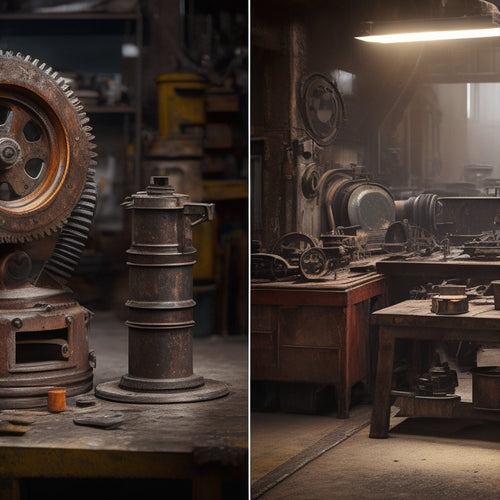
5 Affordable Small Solar Power Systems for Home Installation
Share
You can utilize the benefits of solar energy with compact and cost-effective systems. For small home installations, prioritize high-efficiency solar panels (above 20%) and optimized inverters to minimize energy losses. Consider affordable off-grid systems or DIY solutions, which can be cost-effective and provide energy independence. Compact systems designed for small homes (2-3 bedrooms) typically range from 2-5 kilowatts and feature sleek designs that integrate well with home aesthetics. By exploring these options, you'll find the perfect fit for your energy needs and budget, and uncover how to optimize your system for maximum energy collection and savings.
Key Takeaways
- Small scale solar kits offer affordable options for homeowners, with low upfront costs and easy setup for small-scale energy generation.
- Compact systems designed for small homes (2-3 bedrooms) provide energy efficiency with high-efficiency panels and inverters.
- DIY solar power solutions can be cost-effective, but require proper sizing, configuration, and regular maintenance for optimal output.
- Affordable off-grid systems enable energy independence and reduce reliance on utility companies, with decreasing costs of solar panels and energy storage.
- Look for systems with grid-tie functionality to sell excess energy back to the grid and optimize energy harvesting with efficient solar panels (above 20%).
Top Picks for Residential Use
When considering small solar power systems for residential use, you're likely looking for a reliable and efficient solution that meets your energy needs without breaking the bank.
Top picks for residential use prioritize solar panel efficiency, ensuring maximum energy harvesting from available rooftop space. Look for systems with high-efficiency panels (above 20%) and optimized inverters to minimize energy losses.
Energy storage options are also essential, as they enable you to store excess energy generated during the day for nighttime use or backup power during grid outages.
Lithium-ion batteries are a popular choice due to their compact design, long lifespan, and high depth of discharge. Some systems also offer advanced features like grid-tie functionality, which allows you to sell excess energy back to the grid and offset your utility bills.
Small Scale Solar Kits
Small scale solar kits offer a compact and cost-effective way to dip your toes into renewable energy, providing an ideal entry point for homeowners and DIY enthusiasts alike. These kits usually include everything you need to get started, including solar panels, a charge controller, and an inverter. They're perfect for small-scale energy generation, such as powering a shed, garage, or even a small home.
| Solar Kit Benefits | Installation Tips | Key Considerations |
|---|---|---|
| Easy to install | Choose a location with minimal shading | Check local building codes |
| Low upfront cost | Consider a grid-tie system for energy savings | Assess your energy needs |
| Environmentally friendly | Verify proper wiring and electrical connections | Research local incentives |
When selecting a small scale solar kit, consider the benefits and key considerations mentioned above. Keep in mind that installation tips, such as choosing a location with minimal shading and verifying proper wiring, are essential for peak performance. By doing your research and following these guidelines, you can enjoy the advantages of renewable energy while keeping costs low.
Affordable Off-Grid Systems
You're looking to take your renewable energy efforts to the next level with an affordable off-grid system. This type of system allows you to generate your own electricity, store it in batteries, and use it when you need it, independent of the grid.
Affordable off-grid systems are designed to provide energy independence, giving you the freedom to power your home or cabin without relying on the utility company.
When it comes to cost-effective options, off-grid systems can be a smart choice. They eliminate the need for expensive grid connections, reducing your overall energy costs.
Plus, with the decreasing cost of solar panels and energy storage systems, off-grid systems are becoming more affordable than ever.
To get started, you'll need to assess your energy needs and determine the size of the system you require.
Consider how much energy you use daily, and choose a system that can meet those demands. Look for systems that include a solar array, charge controller, inverter, and battery bank.
With the right components and a bit of planning, you can achieve energy independence with an affordable off-grid system.
DIY Solar Power Solutions
Taking matters into your own hands with DIY solar power solutions can be a cost-effective and enabling way to employ renewable energy. By installing solar panels on your own, you can save on labor costs and take control of your energy production.
However, it's vital to evaluate the technical aspects of DIY solar power solutions. You'll need to verify your system is properly sized, installed, and configured to meet your energy needs.
When it comes to solar panel maintenance, regular cleaning and inspections are fundamental to optimize energy output. You'll also need to take into account energy storage solutions, such as batteries, to store excess energy generated during the day for use at night or during power outages.
This requires a thorough comprehension of your energy usage patterns and the capacity of your solar panel system.
While DIY solar power solutions can be rewarding, it's important to prioritize safety and follow local building codes and regulations.
With the right knowledge and equipment, you can successfully install and maintain your own solar power system, reducing your reliance on the grid and your carbon footprint.
Compact Systems for Small Homes
As homeowners increasingly seek to reduce their environmental impact, compact solar power systems designed specifically for small homes have become an attractive option.
These systems are customized to maximize energy efficiency while minimizing space utilization, making them ideal for smaller properties.
When considering a compact system, you'll want to evaluate your energy needs and assess your roof's solar potential. A typical compact system ranges from 2-5 kilowatts, sufficient to power a small home with 2-3 bedrooms.
Look for systems with high-efficiency panels and inverters to optimize energy production.
Compact systems often feature sleek, streamlined designs that integrate seamlessly into your home's design.
They're also more affordable than larger systems, making them a cost-effective solution for small homeowners.
Additionally, many compact systems come with monitoring capabilities, allowing you to track your energy production and consumption in real-time.
Frequently Asked Questions
Can I Install Solar Panels on a Metal or Asphalt Roof?
You can install solar panels on a metal or asphalt roof, but you'll need to take into account the roof materials' compatibility and structural integrity, as well as additional installation considerations like waterproofing and mounting systems.
Do Solar Panels Work Efficiently in Shaded Areas?
As you step into the dappled shade, you wonder if solar panels will still shine. Unfortunately, shaded areas reduce their efficiency; however, you can investigate solar alternatives like bypass diodes or microinverters to maximize energy output in these areas.
Are Solar Panels Resistant to Extreme Weather Conditions?
You'll be pleased to know that solar panels are designed to withstand extreme weather conditions, boasting impressive durability and resilience in the face of heavy rain, hail, and strong winds, ensuring peak performance even in harsh environments.
Can I Sell Excess Energy Back to the Grid?
You can sell excess energy back to the grid through net metering benefits, which allow you to offset your energy consumption and even receive credits or cash through energy buyback programs, depending on your utility company's policies.
Do Solar Panels Require Regular Maintenance?
"An ounce of prevention is worth a pound of cure" - you'll find that regular maintenance is essential for extending your solar panel lifespan. By doing so, you'll minimize maintenance costs, ensuring a smooth and efficient energy-harvesting experience.
Conclusion
"Seamlessly switch to sustainable solar solutions, shedding shackles of soaring electricity bills. These sleek systems synchronize serendipitously with small homes, simplifying the shift to solar. From DIY delights to compact configurations, our top picks provide painless pathways to renewable energy. With prices plummeting, the prospect of powering your pad with pure, planet-friendly power has never been more plausible."
Related Posts
-

Why Higher Upfront Costs Are Worth It
You pay a premium for high-quality, energy-efficient products, but they're worth it. With durability testing ensuring...
-

What You Need to Know About Permits and Inspections
You need to navigate the complex landscape of permits and inspections to guarantee your project complies with local z...
-

Eco-Friendly Car Battery Solutions Available Online
You can now shop online for eco-friendly car battery solutions that not only reduce your carbon footprint but also of...


